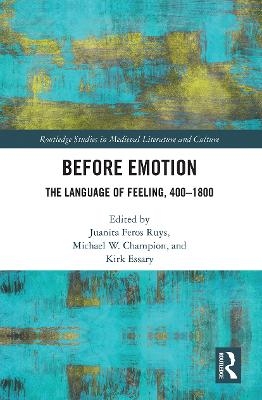
Before Emotion: The Language of Feeling, 400-1800
Routledge (Verlag)
978-1-032-24150-0 (ISBN)
Juanita Feros Ruys received her PhD in English from the University of Sydney. She was Director of the University of Sydney Node of the Australian Research Council Centre of Excellence for the History of Emotions, 2011-2018. She is the author of The Repentant Abelard (2014) and Demons in the Middle Ages (2017), and co-editor of the forthcoming A Cultural History of Emotions in the Medieval Age (Bloomsbury). She is also the writer and producer of the documentary The Devil’s Country, which explores links between the imagery of medieval demonology and the colonial European experience of the Australian landscape. Michael Champion (PhD, Late-Antique Studies, London) is Deputy Director of the Institute for Religion and Critical Inquiry at the Australian Catholic University. His research focuses on late-antique and early-medieval cultural and intellectual history, including the history of emotions and the history of violence. He is the author of Explaining the Cosmos: Creation and Cultural Interaction in Late-Antique Gaza (OUP, 2014) and co-editor of Understanding Emotions in Early Europe (with Andrew Lynch, Brepols, 2015), and Cultural Perceptions of Violence in the Hellenistic World (with Lara O’Sullivan, Routledge 2017). Dr Kirk Essary (PhD, Religion, Florida State University) is Lecturer in History and Classics at the University of Western Australia. His research focuses on intellectual and religious history in the Renaissance and Reformation. He is author of Erasmus and Calvin on the Foolishness of God: Reason and Emotion in the Christian Philosophy (Toronto, 2017), and has published work in several top journals, including Emotion Review, Church History, Erasmus Studies, English Studies, and the Scottish Journal of Theology.
Preface: Thomas Dixon
Introduction: Michael W. Champion, Kirk Essary, and Juanita Feros Ruys
Ch. 1: Jonathan D. Teubner, ‘The Failure of affectus: Affectiones and constantiae in Augustine of Hippo’
Ch. 2: Mark Amsler, ‘Affectus in Medieval Grammar’
Ch. 3: Rita Copeland, ‘Affectio-affectus in Latin Rhetoric up to c. 1200’
Ch. 4: Antonina Harbus, ‘The Old English Vocabulary of Emotions: Glossing affectus’
Ch. 5: Juanita Feros Ruys, ‘Before the Affective Turn: Affectus in Heloise, Abelard, and the Woman Writer of the Epistolae duorum amantium’
Ch. 6: Michael D. Barbezat, ‘Desire to Enjoy Something Thoroughly: The Use of the Latin affectus in Hugh of St Victor’s De archa Noe’
Ch. 7: Constant J. Mews, ‘Affectus in the De spiritu et anima of Alcher of Clairvaux and Cistercian Writings of the Twelfth Century’
Ch. 8: Barbara Newman, ‘Affectus from Hildegard to Helfta’
Ch. 9: Tomas Zahora, ‘Affect, Affections, and Spiritual Capital in the Thirteenth Century’
Ch. 10: Robert C. Miner, ‘Affectus and passio in the Summa theologiae of Thomas Aquinas’
Ch. 11: Naama Cohen-Hanegbi, ‘Accidentia anime in Late Medieval Medicine’
Ch. 12: Paul Megna, ‘Affeccioun in Middle English Devotional Writing’
Ch. 13: Kirk Essary, ‘The Renaissance of affectus? Biblical Humanism and Latin Style'
Ch. 14: Elena Carrera, ‘Augustinian, Aristotelian, and Humanist Shaping of Medieval and Early Modern Emotion: Affectus, affectio, and "affection" as Travelling Concepts’
Ch. 15. R.S. White, ‘Meta-, Mega- and Multiple Emotions in Early Modern English Terminology’
Ch. 16: Anik Waldow, ‘Reconceptualizing Affect: Descartes on the Passions’
Ch. 17: Daniel Canaris and Francesco Borghesi, ‘Defining the Emotions in the Post-Cartesian Humanism of Giambattista Vico’
Ch. 18: Margaret Watkins, ‘Unprincipled by Principle: On Hume’s Use of "Affection"’
Epilogue: Michael W. Champion, ‘From Affectus to Affect Theory and Back Again’
| Erscheinungsdatum | 14.12.2021 |
|---|---|
| Reihe/Serie | Routledge Studies in Medieval Literature and Culture |
| Verlagsort | London |
| Sprache | englisch |
| Maße | 152 x 229 mm |
| Gewicht | 385 g |
| Themenwelt | Geisteswissenschaften ► Sprach- / Literaturwissenschaft ► Anglistik / Amerikanistik |
| Geisteswissenschaften ► Sprach- / Literaturwissenschaft ► Literaturwissenschaft | |
| ISBN-10 | 1-032-24150-0 / 1032241500 |
| ISBN-13 | 978-1-032-24150-0 / 9781032241500 |
| Zustand | Neuware |
| Haben Sie eine Frage zum Produkt? |
aus dem Bereich


